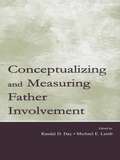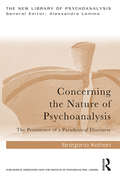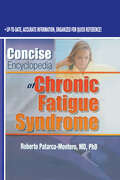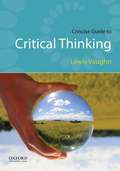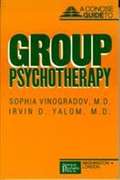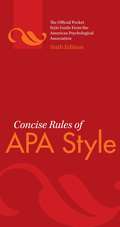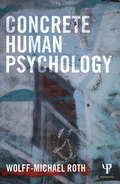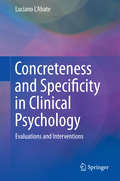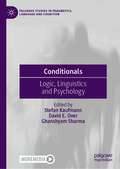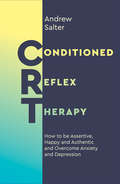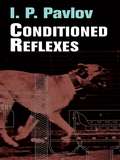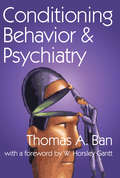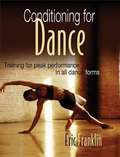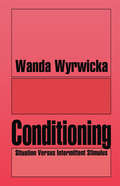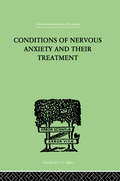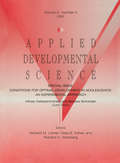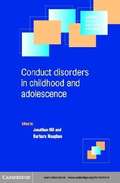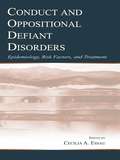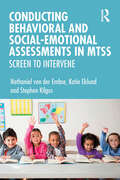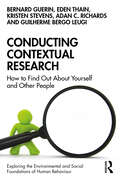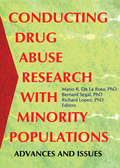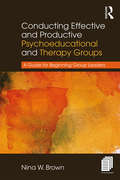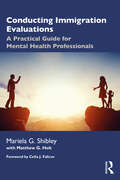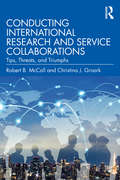- Table View
- List View
Conceptualizing and Measuring Father Involvement
by Michael E. Lamb Randal D. DayAfter decades of focusing on the mother's role in parenting, family studies researchers have turned their attention to the role of the father in parenting and family development. The results shed new light on childhood development and question conventional wisdom by showing that beyond providing the more traditional economic support of the family, fathers do indeed matter when it comes to raising a child. Stemming from a series of workshops and publications sponsored by the Family and Child Well-Being Network, under the federal fatherhood initiative of the National Institute of Child Health and Development, this comprehensive volume focuses on ways of measuring the efficacy of father involvement in different scenarios, using different methods of assessment and different populations. In the process, new research strategies and new parental paradigms have been formulated to include paternal involvement. Moreover, this volume contains articles from a variety of influences while addressing the task of finding the missing pieces of the fatherhood construct that would work for new age, as well as traditional and minority fathers. The scope of this discussion offers topics of interest to basic researchers, as well as public policy analysts.
Concerning the Nature of Psychoanalysis: The Persistence of a Paradoxical Discourse (The New Library of Psychoanalysis)
by Gregorio KohonIn his new book, Considering the Nature of Psychoanalysis: The Persistence of a Paradoxical Discourse, Gregorio Kohon describes the complexity of the psychoanalytic encounter, questioning the misguided attempts to simplify and/or reduce it to either art or science. Kohon disputes the contemporary use of parameters offered by evidence-based medicine as a research model to study psychoanalysis. Instead, he proposes to reconsider the relevance of the psychoanalytic single case study, its importance and pre-eminence. The present book will be of great interest to all psychotherapists, councillors, psychiatrists, mental health workers and students and academics of the social sciences.
Concise Encyclopedia of Chronic Fatigue Syndrome
by Roberto Patarca MonteroAre you in touch with the latest CFS information?The Concise Encyclopedia of Chronic Fatigue Syndrome summarizes current knowledge about Chronic Fatigue Syndrome (CFS) to help doctors and those working with CFS patients become familiar with recent developments and lessons learned about this and related fatiguing disorders. The information has been thoughtfully organized so that you will be able to easily access and become familiar with highlights of the most relevant topics.The Concise Encyclopedia of Chronic Fatigue Syndrome will bring you up-to-date on advances in cardiovascular medicine, endocrinology, epidemiology, immunology, infectious diseases, neurology, psychiatry, and psychology which have served as the basis for the formulation of new lines of research and novel therapeutic interventions for CFS. You'll find valuable information on the A-to-Z of CFS in the Concise Encyclopedia of Chronic Fatigue Syndrome, including the relationships between: AIDS and fatigue brain injury and fatigue cancer and fatigue as well as: demographics of CFS interstitial cystitis MAO inhibitors neuropsychology of CFS psychosocial measures stress factors tumor necrosis factors ...and much moreComprehensive and thorough, the Concise Encyclopedia of Chronic Fatigue Syndrome highlights areas that need more research and gives you greater awareness of this widespread and growing problem. This compendium will educate and create greater CFS awareness among healthcare professionals and the general public.
Concise Guide To Critical Thinking
by Lewis VaughnLewis Vaughn's Concise Guide to Critical Thinking offers a compact, clear, and economical introduction to critical thinking and argumentative writing. Based on his best-selling text, The Power of Critical Thinking, Fifth Edition, this affordable volume is more manageable than larger textbooks yet more substantial than many of the smaller critical thinking handbooks.
Concise Guide to Group Psychotherapy
by Sophia Vinogradov Irvin D. YalomThe Concise Guide to Group Psychotherapy addresses the critical principles and techniques necessary to organize a group and conduct group psychotherapy.
Concise Rules Of APA Style
by American Psychological Association StaffThis text offers writing and formatting standards for students, teachers, researchers, and clinicians working in the field of psychology. It provides complete guidance on the rules of style that are critical for clear communication.
Concrete Human Psychology: Toward A Biologically Plausible Approach
by Wolff-Michael RothPsychology, quantitative or qualitative, tends to conceive of the human person using metaphysical concepts and to separate the practical, affective, and intellectual aspects of participation in everyday life. Lev S. Vygotsky, however, was working towards a "concrete human psychology," a goal that he expresses in a small, unfinished text of the same name. This book articulates the foundation of and develops such a concrete human psychology according to which all higher psychological functions are relations between persons before being functions, and according to which personality is the ensemble of societal relations with others that a person has lived and experienced. Correlated with concern for the concreteness of human life and the psychology that theorizes it is the idea that to live means to change. However, none of the categories we currently have in psychology are categories of change as such. In this work of concrete human psychology, categories are developed on the basis of Vygotsky's work that are suitable to theorize an ever-changing life, including the language humans use to take control over their conditions and to talk about the conditions in which they live.
Concreteness and Specificity in Clinical Psychology: Evaluations and Interventions
by Luciano L'AbateThis provocative volume updates L' Abate's signature ideas, focusing in particular on the concepts of concreteness and specificity as basic tenets of evaluation and therapy. Noting society's growing familiarity with technology, current concerns about treatment accessibility, and widespread interest in wellness promotion, he argues for remote-writing exercises targeted to specific client issues and monitored by the clinician instead of relying on traditional talk-based therapy. This attention to concreteness and specificity in baseline evaluation, post-treatment evaluation, and follow-up, the author asserts, is central to making treatment replicable, less subject to impasses or missteps, and more professional, with the potential of changing how therapy is conducted as well as how clinicians are trained and practice. The book's framework includes rationales, models, empirical data, and examples of prescriptive remote-writing exercises. Featured in the coverage: Online interventions: here to stay and to grow. Verifiability in clinical psychology practices. Present status and future perspectives for personality and family assessment. Practice without theory/combining theory with practice. Toward a unifying framework of human relationships PIPES: Programmed Interactive Practice Exercise and Prescriptions. Concreteness and Specificity in Clinical Psychology will bring a new level of discussion and debate among clinical psychology practitioners and practicing psychotherapists in private practice and the public sector.
Concussive Brain Trauma: Neurobehavioral Impairment & Maladaptation, Second Edition
by Rolland S. ParkerFocusing on a public health problem affecting millions of people of all ages, the second edition of Concussive Brain Trauma: Neurobehavioral Impairment and Maladaptation reflects Dr. Rolland S. Parker's more than 25 years of neuropsychological practice and research in traumatic brain injury and stress, and his prior experience as a clinical psychol
Conditionals: Logic, Linguistics and Psychology (Palgrave Studies in Pragmatics, Language and Cognition)
by Stefan Kaufmann David E. Over Ghanshyam SharmaThis edited book examines conditionals from a number of interdisciplinary perspectives, drawing on research from fields as diverse as linguistics, psychology, philosophy and logic. Across 13 chapters, the authors not only investigate and examine various commonly-held perceptions about conditionals, but they also challenge many of the assumptions underpinning current conditionals scholarship, setting an agenda for future research. Based in part on the papers presented at a unique international summer school - Conditionals in Paris - this volume represents the cutting edge in the study of conditionals, and it will be of interest to scholars in fields including linguistics and psychology, semiotics, philosophy and logic, and artificial intelligence.
Conditioned Reflex Therapy: How to be Assertive, Happy and Authentic and Overcome Anxiety and Depression
by Andrew SalterAndrew Salter's Conditioned Reflex Therapy introduced behavior therapy as well as many specific techniques still used today, including methods for assertion, relaxation, imagery and short-term therapy. CRT includes numerous case studies of how Salter helped clients quickly overcome phobias, anxieties, and depression.Lauded by Aldous Huxley, Andrew Salter's revolutionary book introduced behavior therapy as well as many specific techniques still used today, including methods for assertion, getting in touch with one's feelings, relaxation, imagery, and short-term therapy. Conditioned Reflex Therapy also includes numerous case studies of how Salter helped his clients quickly overcome their phobias, anxieties, and depression.
Conditioned Reflexes
by G. V. Anrep I. P. PavlovThe Nobel Prize-winning scientist offers a precise, full, and accessible exposition of his landmark work in experimental psychology. Pavlov details the technical means by which he established experiments and controls, the experiments, observations on formation of conditioned reflexes, external and internal reflex inhibitions, the function of cerebral hemispheres and cortex, and more. 18 figures.
Conditioning Behavior and Psychiatry
by Thomas A. Ban W. Horsley GanttConditioning is one of the core methods of psychiatry. It is a behavioral method, with a stimulus-response constellation. The stimulus itself can be measured, changed, and combined, and the responses can be measured qualitatively and quantitatively. Conditioning uses the conditional reflex phenomenon. During the conditioning procedure, responses to certain stimuli are acquired where no responses existed previously. Over time behavioral conditioning expanded to include neurophysiological aspects and has been correlated with psychic manifestations. This comprehensive work deals with the conditioning method, covering fully its behavioral, neurophysiological, and psychiatric aspects.The volume is divided into five parts. Part I summarizes present-day knowledge on the neurophysiology of conditioning. Part II sets out the historical sequence in the correlation between psychopathology and pathological brain functions. Part III describes the best-known conditioning techniques applied in human testing, particularly those which are applicable for diagnostic purposes, is discussed. Part IV is concerned with clinical applications of the method and discusses the findings and the implications that it has for psychopathology and therapy or, in general, for psychiatry. Part V contains a critical evaluation of the matter presented, followed by a bibliography and index."Conditioning Behavior and Psychiatry" describes the development of conditioning procedures since the concept was first introduced. It is primarily concerned with the analysis of elementary and complex behavioral observations, of neurophysiological and neuropathological discoveries as seen from the standpoint of psychiatric disorders. The psychiatric view presented is, not purely the Pavlovian, but a modern approach to psychiatry stemming from a Pavlovian orientation.
Conditioning for Dance
by Eric FranklinAll the chapters in this book contain insights into how to create lifelong dancing skills that give you power without hurting your body. These methods illustrate how much more you can achieve if you allow your body's intelligence to help you.
Conditioning: Situation Versus Intermittent Stimulus
by Wanda WyrwickaIn laboratory research, the process of conditioning is traditionally initiated with a single intermittent stimulus (such as a tone or flash of light). This is true of both classical and instrumental research. Because of its role in evoking conditioned behavior, the use of an intermittent stimulus has become an indispensable part of laboratory research on conditioned behavior. The question arises whether the same scheme of conditioning may be applied to behaviors occurring in real life.In Conditioning, Wanda Wyrwicka analyzes evidence of the influence of situations on behavior in laboratory studies. She looks at cases in which the subject's reaction was dependent on complex situations rather than a single stimulus. Wyrwicka suggests that beyond external situations there exists internal factors located in the brain that consist of previous and present experiences that may influence behavior. In Chapter 1, Wyrwicka summarizes Ivan Pavlov's concept of the conditioned reflex using intermittent stimuli. Chapter 2 deals with the mechanisms of motor conditioned behavior and the results of instrumental conditioning studies. Chapter 3 covers the phenomenon called "switching," which is the appearance of a conditioned reaction different than the original conditioned stimulus. In Chapter 4, Wyrwicka describes various studies in which situation becomes a potent factor in conditioned reactions. Chapter 5 describes research pertaining to defensive and alimentary behaviors. Chapter 6 analyzes three examples of complex conditioning: detour, feeding, and presleep behaviors. Chapters 7 and 8 focus on the functions of various internal organs, and the conditioning of electrical brain activity leading to inhibition of epileptic seizures. In her concluding chapter, Wyrwicka discusses theoretically the data mentioned previously.Conditioning opens up rich possibilities for continued exploration. This revealing work will interest scientists specializing in behavioral sciences, psychologists, neuroscientists, educators, as well as students of biology.
Conditions Of Nervous Anxiety And Their Treatment
by Stekel, WFirst published in 1999. Routledge is an imprint of Taylor & Francis, an informa company.
Conditions for Optimal Development in Adolescence: An Experiential Approach: A Special Issue of Applied Developmental Science
by Mihaly Csikszentmihalyi Barbara SchneiderPublished in 2001, Conditions for Optimal Development in Adolescence is a valuable contribution to the field of Developmental Psychology.
Conduct Disorders in Childhood and Adolescence (Cambridge Child and Adolescent Psychiatry)
by Jonathan Hill Barbara Maughan Ian M. GoodyerConduct disorders are very common conditions and the most frequent reason for clinical referrals to child and adolescent mental health facilities. Aggression and oppositional behavior in youth often becomes persistent, and substantially increases the likelihood of adult problems of criminality, unstable relationships, psychiatric disorder, and harsh parenting. This comprehensive book by leading clinicians and researchers reviews established and emerging aspects of conduct disorder. It highlights the complexity and probable heterogeneity of the condition, including the biological, neuropsychological, cognitive factors, and role of attachment and family influences. The book reviews preventive and treatment approaches and outcomes with developmental and gender-based variations emphasized throughout. This uniquely authoritative survey of a common clinical and social problem integrates findings from a wide range of research perspectives, and will be essential reading for mental health practitioners and others with clinical, sociological, or medicolegal interests in child health and behavior.
Conduct and Oppositional Defiant Disorders: Epidemiology, Risk Factors, and Treatment
by Cecilia A. EssauRecent decades have seen a steady rise in the incidence of antisocial behavior in youth. Possible direct consequences aside, such behavior is predictive of chronic emotional, educational, vocational, and emotional impairment that is associated with hundreds of millions of dollars in costs to overtaxed mental health, social services, special education, and juvenile justice systems. Written by an eminent group of international experts, Conduct and Oppositional Defiant Disorders: Epidemiology, Risk Factors, and Treatment offers the first comprehensive cutting-edge overview of all the major aspects of conduct disorder (CD) and oppositional defiant disorder (ODD) in children and adolescents. It is organized into three sections. The first summarizes classification and assessment, epidemiology and comorbidity, as well as course and outcome. The second examines factors that put children and adolescents at risk to develop CD and ODD: contextual, familial/genetic, and neuropsychological and neuroendocrine. The third presents numerous empirically supported approaches to prevention and treatment. An epilogue reviews recent progress and unresolved questions, and suggests needs for future research. Special attention is devoted to gender and developmental pathways in etiology, symptom expression, courses, and outcomes. This volume will be crucial reading for all mental health professionals whose work involves them with these exceptionally difficult clients.
Conducting Behavioral and Social-Emotional Assessments in MTSS: Screen to Intervene
by Nathaniel von der Embse Katie Eklund Stephen KilgusConducting Behavioral and Social-Emotional Assessments in MTSS: Screen to Intervene offers effective assessment strategies for improving mental and behavioral health decision-making within multi-tiered systems of support. Accessible to school psychologists, behavior analysts, PBIS team leaders, and other school-based professionals, this applied book features evidence-based practices and case study examples to show how assessment data can drive prevention and intervention services, particularly at Tiers 1 and 2. Specific tools and recommendations for universal screening, problem analysis, and progress monitoring procedures offer a fresh, real-world approach to data-driven implementation of supports across schools.
Conducting Contextual Research: How to Find Out About Yourself and Other People (Exploring the Environmental and Social Foundations of Human Behaviour)
by Bernard Guerin Eden Thain Kristen Stevens Adan C. Richards Guilherme Bergo LeugiThis innovative book proposes an entirely new approach to social research, presenting practical ways to discover people’s life contexts in order to understand why they do what they do, which is essential for any forms of research that need to understand people.Taking a novel approach that goes beyond traditional categorisations of qualitative and quantitative research, the book starts by discussing the real basis of all research methods in social relationships, before detailing the methods for finding out about a person’s life contexts in very practical terms, accompanied by suggested questions, advice, and research tricks to help you progress. The various life contexts are then worked through chapter by chapter. Drawing on the rich and varied research experiences of all the authors, examples are given throughout, with later chapters focusing on specific research areas.Conducting Contextual Research is essential reading for postgraduate students and professionals in the fields of counselling, psychology and social work, and will be useful to anyone conducting research or inquiries to understand human behaviour, including academic researchers, detectives, intelligence operators, social workers, government service researchers, social policy analysts, and biographers.
Conducting Drug Abuse Research with Minority Populations: Advances and Issues
by Bernard SegalBe a better researcher when studying drug abuse among minorities! Conducting Drug Abuse Research with Minority Populations: Advances and Issues brings you the voices of drug abuse researchers who discuss the most important concerns about conducting research in drug-taking minority populations. In this strategy-based book, you&’ll find yourself beneficially involved in a discussion of many of the central methodological advances facing researchers today, specifically in the target area of minority communities and their drug-using societies. Conducting Drug Abuse Research with Minority Populations presents crucial recommendations and strategies that will lead you toward unprecedented effectiveness and efficiency when researching this subsection of the world&’s drug users. In addition, find new ways to involve community members in the research process, and you&’ll come to more fully understand the impact of cultural values, attitudes, and norms in the drug-taking patterns of minority persons. With this book, you will learn more about: the importance of advisory boards, gatekeepers, and indigenous workers in this type of research the crucial role of incentives in recruiting and retaining minority persons in drug abuse studies focus groups as tools to minimize selection bias of minority subjects how cultural values may affect research strategies how research teams can facilitate the collection of data within minority communities Researchers, college educators, and substance abuse practitioners will find that Conducting Drug Abuse Research with Minority Populations improves their efforts to produce more viable data in a much shorter time span.
Conducting Effective and Productive Psychoeducational and Therapy Groups: A Guide for Beginning Group Leaders
by Nina W. BrownConducting Effective and Productive Psychoeducational and Therapy Groups offers a four-part structure designed to prepare future and beginning group leaders for the challenges that lie ahead: Getting Started, Encouraging Productivity, Troubleshooting/Problem Solving, and Closures. Along the way, readers will find practical, step-by-step instructions and guidance; activities to promote involvement, growth, and self-understanding; as well as processes and procedures to prevent and resolve difficult behaviors. Also included are 40+ activities, a typology of difficult member profiles, strategies to increase leader effectiveness, and a chapter on toxicity among groups as well as group members.
Conducting Immigration Evaluations: A Practical Guide for Mental Health Professionals
by Mariela G. Shibley Matthew G. HoltThis book prepares mental health professionals to conduct a thorough psychological assessment of individuals involved in immigration proceedings and present the results in a professional report. Written by a licensed clinical psychologist with input from an attorney certified in Immigration and Nationality Law, the book uses clear language that makes it accessible to experienced and novice therapists alike. Chapters present a basic legal understanding of various types of immigration cases and detail the process of conducting the clinical interview, choosing the psychological instruments appropriate for each case, and writing the report. The book also covers practical considerations such as testifying in immigration court and expanding your practice to include immigration evaluations. Vignettes and sample reports link theory to real-world situations, drawing from the authors’ multiple years of combined experience. This book is an essential guide for clinicians who want to assist the diverse and often disempowered population of immigrants and their families.
Conducting International Research and Service Collaborations: Tips, Threats, and Triumphs
by Robert B. McCall Christina J. GroarkConducting International Research and Service Collaborations: Tips, Threats, and Triumphs provides academic researchers, as well as non-profit and private professionals, with much-needed guidance on how to plan, implement, and manage international research and intervention projects. Accessibly written and illustrated throughout with examples and case studies of projects from Robert B. McCall and Christina J. Groark's wide-ranging and decades-long experience of cross-border collaborations, this book outlines how to prepare for and ensure success of cross-border research projects and interventions, how to embrace unique circumstances you may encounter, and what to do if things go wrong. Each chapter covers a general domain of concerns, advice, and lessons learned in conducting international collaborative projects followed by concrete illustrations that pertain to them. Key topics covered include launching projects and working with stakeholders, travelling and living abroad, cultural considerations, planning and funding, administrative issues, dealing with crises, and successfully implementing and disseminating findings effectively. This comprehensive guide is ideal for researchers and project managers – from large, global organizations to small NGOs, human services, private industry, and other fields embarking on such projects, as well as university students and academics.
